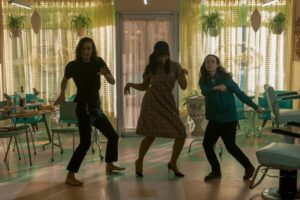As the adage goes, “Those who cannot remember the past are condemned to repeat it.”
In the case of the members of the Umbrella Academy, however, they are simply condemned to repeat the past, or in this case, the future.
Season 2 of Netflix’s “The Umbrella Academy” premiered on the platform July 31 with a total of 10 episodes.
The second season picks up straight after the events of the first, with the super-powered Academy members narrowly avoiding the end of the world in 2019 by traveling back in time.
However, things go awry as the seven siblings become stranded across different years of the early 1960s in Dallas, Texas, left to fend for themselves until Number Five (Aidan Gallagher) arrives.
Yet, when Five reappears, he finds himself in the middle of another apocalyptic event as the Soviet Union is in the process of invading the United States, mere minutes from total nuclear destruction.

Five catches a glimpse of his other siblings fighting alongside American soldiers before former time traveling hit-man Hazel (Cameron Britton) takes him back 10 days prior to the event, leaving Five and the rest of the
Academy to prevent an upcoming apocalypse yet again.
Loosely based on the second series run of the comic, aptly titled “The Umbrella Academy: Dallas,” season 2 brings a lot more charm and quirk to the screen that only appeared in brief bursts during the first season.
Being left alone to their own devices for a year or two, with the locations of their siblings unknown, each member forges a new life for themselves until Five arrives.
Klaus (Robert Sheehan), still accompanied by the ghost of his brother Ben (Justin Min) moves to San Francisco to form a cult based on him performing parlor tricks for the rich and famous with the help of Ben, spouting lyrics of songs from the future as his own aphorisms.
Allison (Emmy Raver-Lampman) leads local Civil Rights protests with her new husband, Raymond Chestnut (Yusuf Gatewood), contrasting with Luther (Tom Hopper) now employed as bodyguard and underground ring-fighter for infamous nightclub owner Jack Ruby.
Last but not least, Vanya (Elliot Page) and Diego (David Casteñeda) are both stranded, with Vanya having lost her memory after being hit by a car upon her appearance in 1963 and Diego being locked up in a mental ward after trying to enact various plans to stop the assassination of John F. Kennedy.
While the first few episodes take a bit to actually reunite the Hargreeves siblings, they don’t drag on like each episode seemed to during the first season. Episodes are paced a lot faster, not lingering so long on scenes that could have potentially been much shorter.
Because of this faster pace, the story is much more intriguing and engaging as it is allowed the chance to focus on the different siblings in equal time.
The story also has a much better balance between the everyday dilemmas and the more absurd, science-fiction aspects of the story like the characters powers and the timeline governing Commission.
Twists and turns are also more abundant in the plot with character redirection and returning cast that play a larger role, allowing more character actors the chance to shine in spots where they were barely even background characters before.
Along with trying to deal with everyday life and prevent another apocalypse, the Academy faces another foe from the Commission, a trio of hit-men known as the Swedes. While the Swedes don’t play a large role for much of the season, they serve as an excuse to have action set pieces using the show’s brilliant soundtrack.

The comedy is much more on point as the season adopts a more lighthearted tone. This is ironic as some episodes deal with heavier topics such as the Civil Rights movement, protests, and police brutality. However, these heavier moments get just the right amount of screen time to bring light to the issues and address them without completely bogging down the tone.
Not everything about “The Umbrella Academy” is improved in season two, however.
Certain points try to overplay the comedic presentation by adopting a comic book style.
This can be seen in scenes such as when Five explains the different side effects of Paradox Psychosis in episode 8. The different side effects are visually listed on the screen as Five goes through them, but do not present themselves in an interesting enough fashion to warrant this addition. If more scenes were visualized like this throughout the season, it may be more fitting, but with only one or two other instances of more comic-esque presentation, it just feels out of place.
Characterization for some of the siblings can sometimes be grating as well, despite them being much more well written. Diego especially proves to be annoying upon his insistence of preventing JFK’s assassination despite previous lessons on how interfering with the timeline can be a bad thing.
Klaus, while still primarily the comedic relief, loses some sympathy during the middle of the series as he breaks three years of sobriety, one of season one’s major plot goals, and remains intoxicated for a large remainder of the season.
These characterization issues are more minor nitpicks, thankfully, and don’t ultimately take away from the increase in quality that the second season sees.
Much like its predecessor, this season leaves on a large cliffhanger that seems to take inspiration from the comic’s third and fourth volumes “The Umbrella Academy: Hotel Oblivion” and “The Sparrow Academy,” engaging viewers in speculation for what the potential third season will hold.

